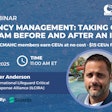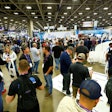
As an industry, we accomplish more working together than we do on our own, and nothing makes that point better than the recent lobbying efforts of the Pool and Hot Tub Alliance. At the federal level alone, PHTA is advocating for the industry on a wide range of topics, including labeling for water-conserving pool covers, standards for energy-efficiency pool pump motors, summer work and travel visas, and tariff exclusions.
Here’s a brief update on each of these efforts.
WATERSENSE LABELING FOR POOL COVERS
The EPA published its Notice of Intent to develop specifications for pool covers that would qualify for its WaterSense program. WaterSense typically labels products that are at least 20% more water efficient, perform as well as or better than standard models and can realize water savings on a national level. The EPA is looking to grant WaterSense status to pool covers that reduce evaporation by at least 80%. Currently, the EPA is defining a pool cover as “a cover which can be placed over the water area of a swimming pool and is intended for use during the open swim season,” such as automatic pool covers. Winter covers would be excluded, as they are not designed for daily use.
There are about 8.5 million existing pools (in-ground and above-ground) installed in residences and more than 240,000 pools installed in commercial locations across the 48 contiguous states and the District of Columbia, according to 2016 figures from P.K. Data. As of now, automatic covers are used on fewer than 10% of them.
The EPA estimates that a typical residential pool in the U.S. can lose between 12,000 and 31,000 gallons of water to evaporation every year, depending on water surface area and exposure to wind, sunlight, temperature and humidity. The best way to prevent pool water evaporation is to use a pool cover whenever the pool is not in use. Plus, because pool covers keep water cleaner, water is saved via reduced filter cleaning.
RELATED: Getting to Know Sabeena Hickman, PHTA’s New CEO
Having pool covers qualify for WaterSense labeling would be a marketing coup for the industry, akin to having an appliance qualify for EnergyStar labeling. That’s why PHTA has played an integral role in shaping the draft specifications, which are still open for public comment. Interested parties can read all about the proposed specification, Notice of Intent, and the public comments submitted to date by going online to epa.gov/watersense/pool-covers.
There’s no statutory deadline for public comments. Rather, the EPA has a policy of taking comments “throughout the process,” says Carl Chidlow, a lobbyist for PHTA. Any interested parties still have time to submit comments in favor or against the specifications outlined by the EPA.
DOE RULE FOR POOL PUMP MOTORS
As most pool builders are aware, the industry must comply with a new standard for dedicated purpose pool pumps beginning July 19, 2021. This is the culmination of a long process that began with the formation of PHTA’s Energy Coalition (which is funded by additional funds from key membership stakeholders) in 2013. Working with the Department of Energy, PHTA helped to shape the final rule, which was published by DOE in January 2017 and became effective in May 2017.
The rule applies primarily to variable-speed pool pumps, which will become the standard because of their energy-saving capabilities. According to PHTA’s analysis, pumps meeting the new standard will save 70% on energy, saving the typical pool owner $500 to $600 per year.
PHTA has been busy communicating the new standard to the industry, including holding workshops at various industry trade shows and conferences. With the compliance date fast approaching, PHTA is planning much more outreach for 2020.
Some highlights of the dedicated purpose pool pump rule include:
- The primary categories affected include self-priming (in-ground) pool pumps, non-self-priming (most aboveground) pool pumps and pressure cleaner booster pumps.
- For self-priming pool pumps, variable-speed pumps will become the most common type used. However, smaller high-efficiency single-speed pumps will still be available.
- For non-self-priming pumps and pressure cleaner booster pumps, higher-efficiency single-speed pumps will remain the most common types used.
- Requirements do not change based on end application. That means it does not matter if the pump is used for filtration, water features, etc.
- It applies to both residential and commercial pool pumps up to 2.5 hydraulic hp, which is based on flow rate, and is equivalent to about 5 motor hp.
Not included in the new pool pump standard, however, are the actual replacement motors that are used when a pool pump motor needs replacing. That has raised the concern that service companies might simply replace a malfunctioning variable-speed pool pump motor with a single-speed motor, thereby erasing all of the energy savings potential the homeowner had with the variable-speed pump.
“Without a standard for motors, it defeats the whole purpose of the dedicated purpose pool pump rule,” says Jennifer Hatfield, director of government affairs for PHTA. “A standard for motors is needed to close the loophole.”
That’s why PHTA has been rushing to get a new rule for pool pump motors approved before the industry must comply with the new dedicated pool pump standard. This spring, the DOE published its intent to move forward with the standard for motors. To further spur the DOE to act quickly, PHTA was also able to have report language inserted into House and Senate fiscal year 2020 appropriations packages. That language strongly encourages DOE to expedite the process toward final adoption.
RELATED: PHTA Welcomes New Vice President of Education
Meanwhile, PHTA is also working with the California Energy Commission to draft a state rule for replacement pool pump motors. It’s not clear yet whether the CEC or DOE will act first. Any federal rule would override state rules, but a CEC rule could readily be adopted by other states. PHTA’s concern is a patchwork of regulations, which is why it is urging DOE to act expeditiously in order to have one national standard.
In related news, PHTA has been working to have energy-saving pool pumps included in the HOMES Act, which provides monetary incentives for homeowners that retrofit their abodes with energy-saving products. While new pools would have to be built with the new energy-saving pumps after July 19, 2021, a tax incentive for retrofitters could convince many pool owners to switch to newer energy-efficient pumps before their old pumps break down.
SUMMER WORK AND TRAVEL VISA PROGRAM
Each summer, myriad U.S. aquatic facilities — from waterparks to commercial pools — rely on trained lifeguards from Europe coming to the United States using the Summer Work Travel program. Designed as a cultural exchange program, Summer Work Travel provides foreign students with an opportunity to live and work in the U.S. during their summer vacation from college or university.
Currently, more than 104,000 students come to the United States each summer via the program, with about 8 to 10% of them working in the aquatics industry, Chidlow estimates. However, with the current administration’s crackdown on immigration and allegations that guest workers take jobs away from Americans, there are concerns that this program might be scaled back or eliminated, causing much consternation within the commercial aquatics industry.
In reality, an increasing number of young U.S.-born workers would rather pursue extra college credits and internships than summer jobs, Chidlow says. Therefore, reducing the number of visas for the program would harm businesses and local economies, he says.
PHTA has been lobbying the State Department to maintain lifeguarding as a qualifying job for the program. “We’ve been making sure members of Congress know that there are some working travel visa participants in their congressional district, and we’ve brought forth the employers to say, ‘Hey, I operate 10 swimming pools in your congressional district and this is how the program works,’” says Chidlow. “We’re making sure members of Congress know that if this program goes away, it’s going to have a very negative impact — not just on swimming pools, but on any congressional district that relies on summer economic activity. So, we’re just making sure both Republicans and Democrats on Capitol Hill understand that this program is there, that it’s in their congressional districts, it’s providing a good backbone to the local economy and Trump and/or his advisors may try to take a swipe at it.”
Meanwhile, PHTA and other stakeholders are also advocating that a mandatory minimum number of visas be made available each year so that employers can better plan. As of now, there is no statutory number of visas issued each year, which would leave a wide range of industries fighting over a small pool of guest works should the program be unexpectedly scaled back.
TARIFF EXCLUSIONS
The ongoing trade war with China has made most businesses that rely on imports from that country anxious. Understanding that knowledge is power, PHTA produced a detailed webinar last fall that outlined what importers can do to try to have products excluded from the new tariffs.
“In terms of tariffs, things have gone from bad to worse,” Chidlow says.
To recap, the initial round of 25% tariffs that took effect July 6, 2018, applied to $34 billion in trade. Since then, additional rounds of tariffs have been imposed, bringing the total to $250 billion. In addition, the tariffs were to be increased from 25 to 30%, as of Oct. 15, 2019. Another swath of products was assessed a 15% tariff on Sept. 1, 2019, and yet another group was to be assessed a 15% tariff starting Dec. 15.
With each phase, importers had a deadline for requesting a product exclusion, and the deadline for the third phase expired on Sept. 30.
However, on Oct. 11, Trump said that he had reached a “substantial” deal with China that would forestall the planned tariff increase on Oct. 15, providing a temporary détente in the yearlong trade war.
“Unfortunately, the policymaking here has been done mostly by Twitter,” Chidlow says, referring to President Trump’s favored method of communication. “So, folks sometimes don’t know until they deal with their customs broker that they’re on a list.”
RELATED: PHTA Consolidates NSPF and APSP Courses
To help companies navigate the ever-changing tariff landscape, PHTA has been showing members how to complete an exclusionary request form, which requires a lot of economic data that shows the impact the tariff has on one’s business. For example, one might make the case that a product or component cannot be sourced elsewhere and the increase in cost will force the company to lay off workers or even close up shop.
It’s a rather obtuse process and “a lot of companies have never had to go through that exercise in the past,” Chidlow says.
The real work, however, begins after the exclusion form is filed. That’s because there is such a backlog of appeals, the best chance of getting action on an exclusion request is to have a close relationship with one’s elected representatives in Congress and asking them to push for a prompt and favorable review, Chidlow says.
“The emphasis is on getting your member of Congress involved because that really, I think, is the only thing that’s really going to matter to the office of the trade ambassador,” Chidlow says. “It’s a political process. You can write the most eloquent exclusion request form known to man but it’s going to languish, and you may have said something in there that some bureaucrat doesn’t agree with and you’re denied. It’s unlike anything I’ve ever seen in terms of executive power overreach and I feel for these guys who are dealing with it. Normally, if somebody imposes new prices on you, you adjust accordingly. But here, the people imposing new costs on you are the U. S. government.”
There are tens of thousands of different products caught up in this, and “each company, unfortunately, is pretty much on their own,” Chidlow says. “There are a lot of people caught in the crossfire right now, and the only relief that’s going to get you anywhere, in my view, is getting your members of Congress involved.”
Considering the fact that each company may be facing a specific set of circumstances, PHTA advises companies to retain outside counsel that can help them engage their congressional delegation in order to assist them on their specific needs.





































